8年级上英语语法重点和知识点归纳
- 格式:doc
- 大小:315.50 KB
- 文档页数:36
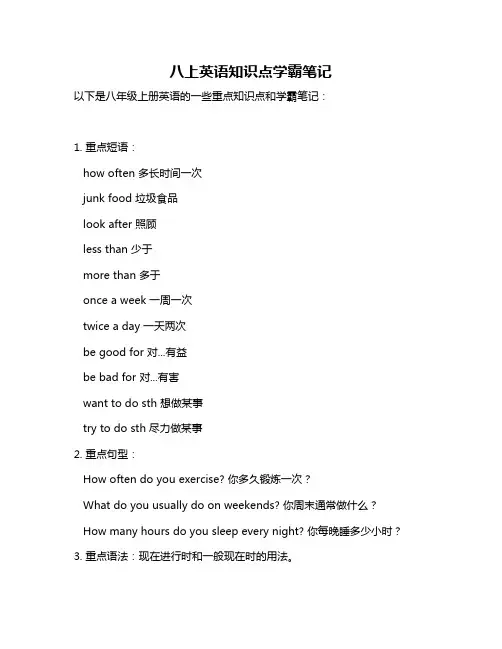
八上英语知识点学霸笔记
以下是八年级上册英语的一些重点知识点和学霸笔记:
1. 重点短语:
how often 多长时间一次
junk food 垃圾食品
look after 照顾
less than 少于
more than 多于
once a week 一周一次
twice a day 一天两次
be good for 对...有益
be bad for 对...有害
want to do sth 想做某事
try to do sth 尽力做某事
2. 重点句型:
How often do you exercise? 你多久锻炼一次?
What do you usually do on weekends? 你周末通常做什么?
How many hours do you sleep every night? 你每晚睡多少小时?
3. 重点语法:现在进行时和一般现在时的用法。
4. 重点词汇:频率副词(always, usually, often, sometimes, never)、表示喜好的动词(like, love, prefer, enjoy)和名词(hobby)。
5. 学习方法建议:
多读多听,培养语感。
可以选择一些适合自己水平的英文材料,每天坚持阅读和听力训练。
归纳总结,建立知识体系。
可以将所学知识进行分类整理,形成自己的知识体系,方便记忆和应用。
注重实践,提高应用能力。
可以多做一些练习题,尝试用英语表达自己的意思,提高英语应用能力。
以上内容仅供参考,建议根据实际情况进行学习和归纳。
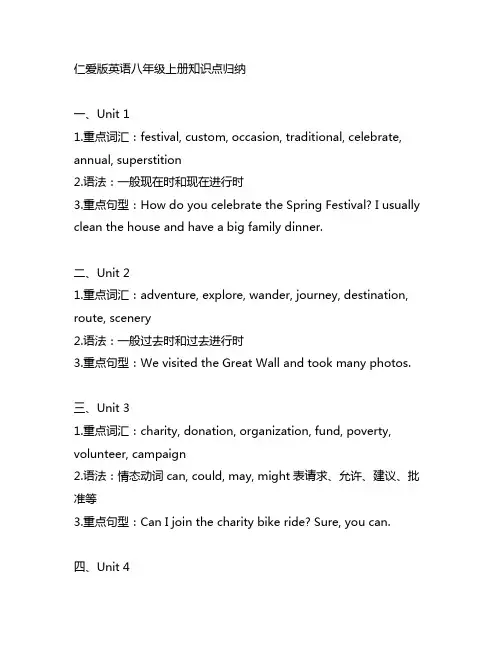
仁爱版英语八年级上册知识点归纳一、Unit 11.重点词汇:festival, custom, occasion, traditional, celebrate, annual, superstition2.语法:一般现在时和现在进行时3.重点句型:How do you celebrate the Spring Festival? I usually clean the house and have a big family dinner.二、Unit 21.重点词汇:adventure, explore, wander, journey, destination, route, scenery2.语法:一般过去时和过去进行时3.重点句型:We visited the Great Wall and took many photos.三、Unit 31.重点词汇:charity, donation, organization, fund, poverty, volunteer, campaign2.语法:情态动词can, could, may, might表请求、允许、建议、批准等3.重点句型:Can I join the charity bike ride? Sure, you can.四、Unit 41.重点词汇:weather forecast, hurricane, tornado, thunderstorm, lightning, disaster, rescue2.语法:虚拟语气3.重点句型:If I were you, I would take an umbrella because it may rain this afternoon.五、Unit 51.重点词汇:talent show, contestant, judge, round, applause, champion, performance2.语法:感叹句3.重点句型:What a wonderful performance!六、Unit 61.重点词汇:hobby, furniture, instrument, recipe, exhibition, display, masterpiece2.语法:动词不定式3.重点句型:She likes to play the piano in her free time.七、Unit 71.重点词汇:environment, pollution, recycle, global warming, carbon dioxide, emissions, alternative2.语法:虚拟语气3.重点句型:If we don't take action now, the environment will bein great danger.八、Unit 81.重点词汇:vacation, destination, souvenir, guidebook, sightseeing, journey, amodation2.语法:宾语从句3.重点句型:I want to know where you are going for vacation.以上是仁爱版英语八年级上册的知识点归纳。
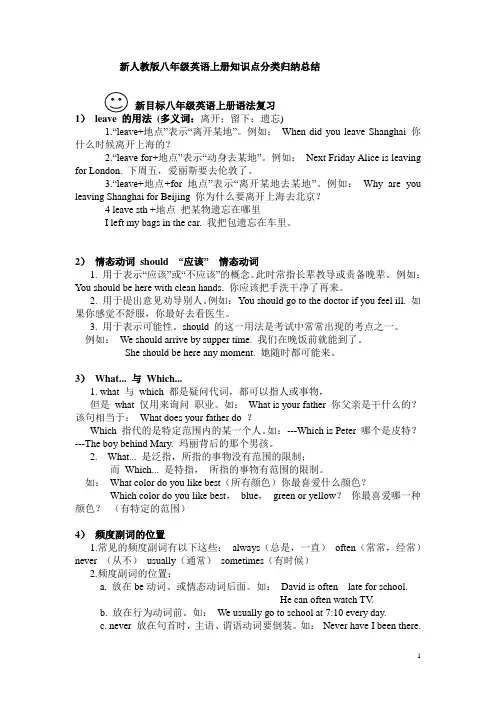
新人教版八年级英语上册知识点分类归纳总结新目标八年级英语上册语法复习1)(多义词:离开;留下;遗忘)1.“leave+地点”表示“离开某地”。
例如:When did you leave Shanghai 你什么时候离开上海的?2.“leave for+地点”表示“动身去某地”。
例如:Next Friday Alice is leaving for London. 下周五,爱丽斯要去伦敦了。
3.“leave+地点+for地点”表示“离开某地去某地”。
例如:Why are you leaving Shanghai for Beijing 你为什么要离开上海去北京?4 leave sth +地点把某物遗忘在哪里I left my bags in the car. 我把包遗忘在车里。
2)情态动词should “应该” 情态动词1. 用于表示“应该”或“不应该”的概念。
此时常指长辈教导或责备晚辈。
例如:You should be here with clean hands. 你应该把手洗干净了再来。
2. 用于提出意见劝导别人。
例如:You should go to the doctor if you feel ill. 如果你感觉不舒服,你最好去看医生。
3. 用于表示可能性。
should 的这一用法是考试中常常出现的考点之一。
例如:We should arrive by supper time. 我们在晚饭前就能到了。
She should be here any moment. 她随时都可能来。
3)What... 与Which...1. what 与which 都是疑问代词,都可以指人或事物,但是what 仅用来询问职业。
如:What is your father 你父亲是干什么的?该句相当于:What does your father do ?Which 指代的是特定范围内的某一个人。
如:---Which is Peter 哪个是皮特?---The boy behind Mary. 玛丽背后的那个男孩。
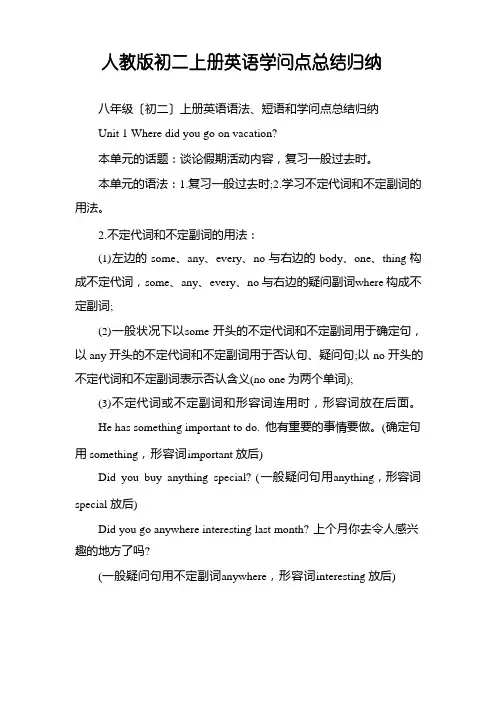
人教版初二上册英语学问点总结归纳八年级〔初二〕上册英语语法、短语和学问点总结归纳Unit 1 Where did you go on vacation?本单元的话题:谈论假期活动内容,复习一般过去时。
本单元的语法:1.复习一般过去时;2.学习不定代词和不定副词的用法。
2.不定代词和不定副词的用法:(1)左边的some、any、every、no 与右边的body、one、thing 构成不定代词,some、any、every、no 与右边的疑问副词where 构成不定副词;(2)一般状况下以some 开头的不定代词和不定副词用于确定句,以any 开头的不定代词和不定副词用于否认句、疑问句;以no 开头的不定代词和不定副词表示否认含义(no one 为两个单词);(3)不定代词或不定副词和形容词连用时,形容词放在后面。
He has something important to do. 他有重要的事情要做。
(确定句用something,形容词important 放后)Did you buy anything special? (一般疑问句用anything,形容词special 放后)Did you go anywhere interesting last month? 上个月你去令人感兴趣的地方了吗?(一般疑问句用不定副词anywhere,形容词interesting 放后)(4)不定代词和不定副词做主语时,后面的动词用单数形式。
Everone is here today.今日每个人都在这里。
本单元的短语和学问点:1.go on vacation 去度假go to the mountains 上山/进山2.s tay at home 呆在家go to the beach 去海滩visit museums 参观博物馆go to summer camp 去参观夏令营3. study for tests 为考试而学习\备考go out 出去4. quite a few 相当多,不少(后跟可数名词复数)take photos 照相most of the time大局部时间5.buy sth for sb = buy sb sth为某人买某物6.taste good. 尝起来很好taste(尝起来)、look(看起来)、sound(听起来)为感官动词,后跟形容词7.h ave a good\great\fun time 过得快活,玩得开心(=enjoy oneself) 8. go shopping 去购物9. nothing…but+动词原形:除了……之外什么都没有He had nothing to do at home but read yesterday.昨天他在家除了读书无事可做。
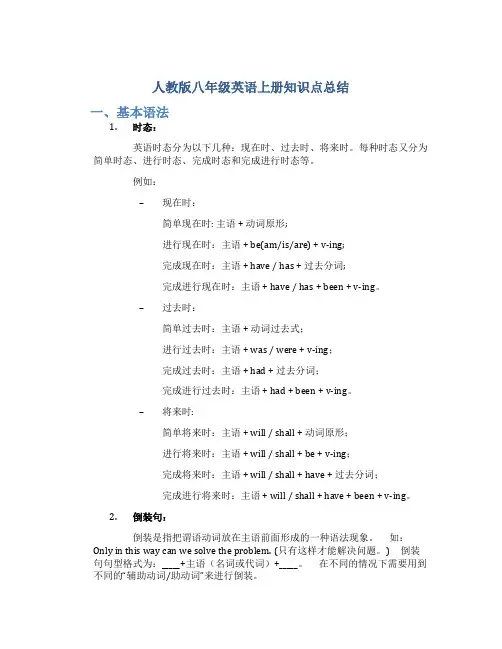
人教版八年级英语上册知识点总结一、基本语法1.时态:英语时态分为以下几种:现在时、过去时、将来时。
每种时态又分为简单时态、进行时态、完成时态和完成进行时态等。
例如:–现在时:简单现在时: 主语 + 动词原形;进行现在时:主语 + be(am/is/are) + v-ing;完成现在时:主语 + have / has + 过去分词;完成进行现在时:主语 + have / has + been + v-ing。
–过去时:简单过去时:主语 + 动词过去式;进行过去时:主语 + was / were + v-ing;完成过去时:主语 + had + 过去分词;完成进行过去时:主语 + had + been + v-ing。
–将来时:简单将来时:主语 + will / shall + 动词原形;进行将来时:主语 + will / shall + be + v-ing;完成将来时:主语 + will / shall + have + 过去分词;完成进行将来时:主语 + will / shall + have + been + v-ing。
2.倒装句:倒装是指把谓语动词放在主语前面形成的一种语法现象。
如:Only in this way can we solve the problem. (只有这样才能解决问题。
) 倒装句句型格式为:_____+主语(名词或代词)+_____。
在不同的情况下需要用到不同的“辅助动词/助动词”来进行倒装。
3.被动语态:被动语态就是在句子中表达动作的承受者(即主语)的语态。
结构为:被(或受)动责任的动词(to be) + 过去分词。
如:The book was written by him.(这本书是由他写的。
)4.虚拟语气:虚拟语气是指在表示假设,愿望,建议等语气时所使用的一种语态形式。
其结构为:主语+should/could/might/would+(have)+动词原形。
如: If I were you, I would buy this dress(如果我是你,我会买这件衣服。
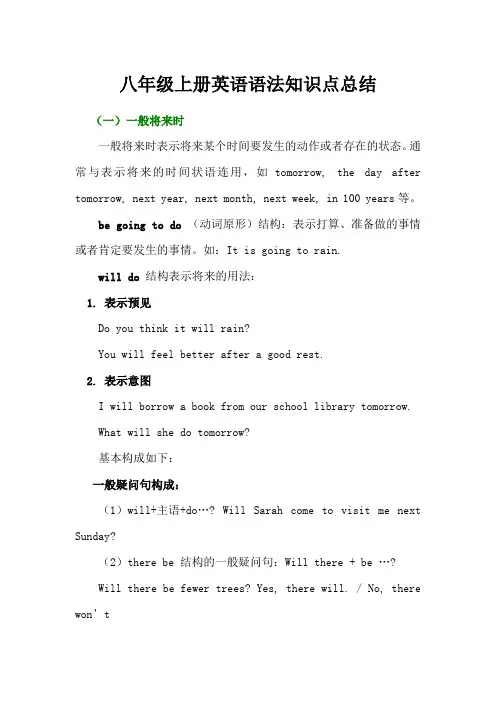
八年级上册英语语法知识点总结(一)一般将来时一般将来时表示将来某个时间要发生的动作或者存在的状态。
通常与表示将来的时间状语连用,如tomorrow, the day after tomorrow, next year, next month, next week, in 100 years等。
be going to do(动词原形)结构:表示打算、准备做的事情或者肯定要发生的事情。
如:It is going to rain.will do结构表示将来的用法:1. 表示预见Do you think it will rain?You will feel better after a good rest.2. 表示意图I will borrow a book from our school library tomorrow. What will she do tomorrow?基本构成如下:一般疑问句构成:(1)will+主语+do…? Will Sarah come to visit me next Sunday?(2)there be 结构的一般疑问句:Will there + be …?Will there be fewer trees? Yes, there will. / No, there won’t否定句构成:will + not (won’t)+doSarah won’t come to visit me next Sunday.特殊疑问句构成:特殊疑问词+will+主语+…?What will Sarah do next Sunday?练一练根据例句,用will改写下列各句例:I don’t feel well today. (be better tomorrow)I’ll be better tomorrow.1. Gina has six classes today. (have a lot of homework tonight)_____________________________2. I’m tired now. (sleep later)_____________________________3. My parents need a new car. (buy one soon)_____________________________4. We can’t leave right now. (leave a little later)_____________________________5. The weather is awful today. (be better tomorrow)_____________________________答案:1. She’ll have a lot of homework tonight.2. I’ll sleep later.3. They’ll buy one soon.4. We’ll leave a little later.5. Maybe it’ll be better tomorrow.(二)should的用法:should用来提出建议和忠告,后边加动词原形,否定句直接在should后边加not.例如:I think you should eat less junk food.我认为你应该少吃垃圾食品。
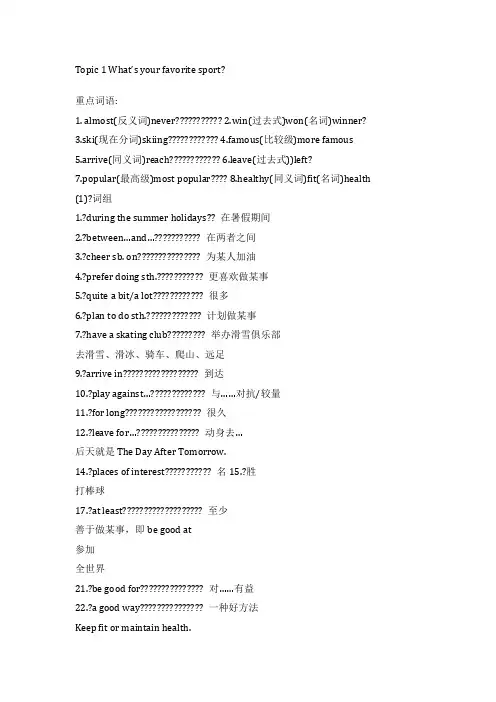
Topic 1 What’s your favorite sport?重点词语:1. almost(反义词)never2.win(过去式)won(名词)winner?3.ski(现在分词)skiing4.famous(比较级)more famous5.arrive(同义词)reach6.leave(过去式))left?7.popular(最高级)most popular 8.healthy(同义词)fit(名词)health (1)?词组1.?during the summer holidays?? 在暑假期间2.?between…and… 在两者之间3.?cheer sb. on 为某人加油4.?prefer doing sth. 更喜欢做某事5.?quite a bit/a lot 很多6.?plan to do sth. 计划做某事7.?have a skating club 举办滑雪俱乐部去滑雪、滑冰、骑车、爬山、远足9.?arrive in 到达10.?play against… 与……对抗/较量11.?for long 很久12.?leave for… 动身去…后天就是The Day After Tomorrow.14.?places of interest 名15.?胜打棒球17.?at least 至少善于做某事,即be good at参加全世界21.?be good for 对……有益22.?a good way 一种好方法Keep fit or maintain health.24.?relax oneself 放松某人自己重点句型你最喜爱的运动是什么?26.?Which sport do you prefer? = Which sport do you like better? 你更喜欢什么运动?I prefer skating. = I like skating better. 我更喜欢滑雪.你常滑雪吗?或Do you often skate?28.?She spends at least half an hour in the gym every day. 每天她至少花半小时在体育馆.29.?She plays baseball pretty well and she is also good at jumping.她棒球打得相当好而且擅长于跳.30.?What kind of sports do you like? = Which sport do you like? 你喜欢哪种运动? 重点语言点31.?see sb. do sth? “看见某人做了某事” 强调动作的全过程,常与every day; often 等连用.see sb. doing sth.? “看见某人正在做某事” 强调动作正在进行.I saw you play basketball almost every day during summer holidays.I often see him draw pictures near the river. 我常看见她在河边画画.I saw her go across the street.? 我看见她过了马路我看见她正在过马路。
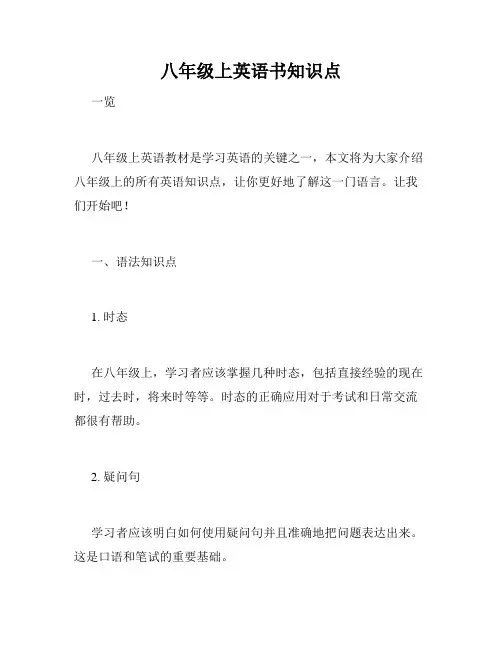
八年级上英语书知识点一览八年级上英语教材是学习英语的关键之一,本文将为大家介绍八年级上的所有英语知识点,让你更好地了解这一门语言。
让我们开始吧!一、语法知识点1. 时态在八年级上,学习者应该掌握几种时态,包括直接经验的现在时,过去时,将来时等等。
时态的正确应用对于考试和日常交流都很有帮助。
2. 疑问句学习者应该明白如何使用疑问句并且准确地把问题表达出来。
这是口语和笔试的重要基础。
3. 动词和介词常用动词和介词表达了英语语言意义的多样性和深度,它们应该在八年级上得到深入学习和理解。
4. 语态和虚拟语气学习者应该掌握正确使用语态,如主动和被动语态等,以及虚拟语气的使用。
二、单词和词汇知识点1. 基础词汇学习者应该学好基础词汇,在之后的学习中学到其他更复杂的英语单词和意思。
2. 成语和俚语成语和俚语在英语语言中很重要,它们可以丰富语言表达,但是学习者应该善于辨别这些词汇的意思和用法。
3. 词根和前后缀学习者应该注意单词中的词根和前后缀,并能够根据上下文推断出它们的意思。
三、阅读知识点1. 板块阅读技巧学习者需要学会如何分配自己的时间和控制阅读的速度,以便在时间充分的情况下完成阅读任务。
2. 大意推断和全文理解学习者需要学习如何推断文章的大意和全文理解,然后从中提取重要信息。
3. 阅读表达学习者要学习如何通过文字表达自己的观点和思想,并展示自己的阅读理解。
四、写作知识点1. 英语文章的基本引言和结论学习者应该掌握基础英文写作结构,并能够编写文章的引言和结论。
这是描述和表达英文文章中的重要组成部分。
2. 句法和语法学习者需要学习英文文章中复杂句型的运用,如引言,对比和对话。
句子应该结构明确,符合语法,否则会影响表达清晰度。
3. 表达方式和风格学习者要掌握多种表达方式和风格,从而编写清晰,完整和表达的语言。
五、口语和听力知识点1. 原声音频学习者应该借助音频来听力练习和口语训练,从而更好地提升自己的英语听力和口语水平。
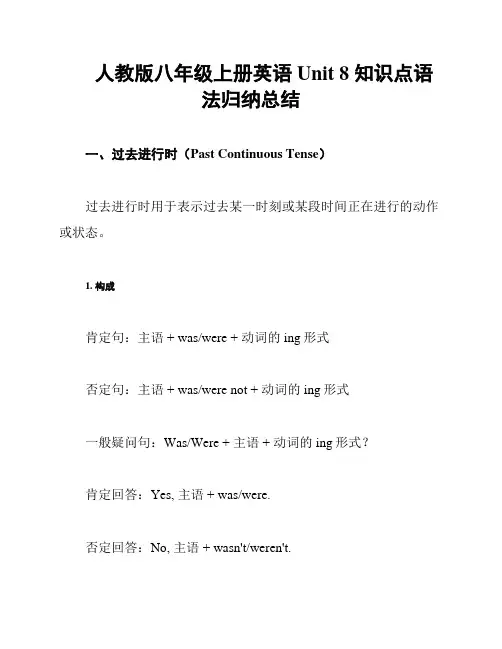
人教版八年级上册英语Unit 8 知识点语法归纳总结一、过去进行时(Past Continuous Tense)过去进行时用于表示过去某一时刻或某段时间正在进行的动作或状态。
1. 构成肯定句:主语 + was/were + 动词的ing形式否定句:主语 + was/were not + 动词的ing形式一般疑问句:Was/Were + 主语 + 动词的ing形式?肯定回答:Yes, 主语 + was/were.否定回答:No, 主语 + wasn't/weren't.2. 使用场景过去进行时常用于以下场景:- 表示过去某一时刻正在进行的动作- She was cooking dinner when I arrived. (我到达的时候,她正在做晚饭。
)- 表示过去某一段时间内持续进行的动作- They were playing basketball all afternoon. (他们整个下午都在打篮球。
)- 表示过去两个同时进行的动作- While he was studying, I was watching TV. (他在研究的时候,我正在看电视。
)二、过去完成时(Past Perfect Tense)过去完成时用于表示在过去某一时间或动作之前已经发生的动作或状态。
1. 构成肯定句:主语 + had + 过去分词否定句:主语 + hadn't + 过去分词一般疑问句:Had + 主语 + 过去分词?肯定回答:Yes, 主语 + had.否定回答:No, 主语 + hadn't.2. 使用场景过去完成时常用于以下场景:- 表示在过去某一时间或动作之前已经发生的动作- They had already left when I arrived. (当我到达时,他们已经离开了。
)- 表示过去某一时间之前已经完成的动作- She had finished her homework before dinner. (她在晚饭之前已经完成了作业。
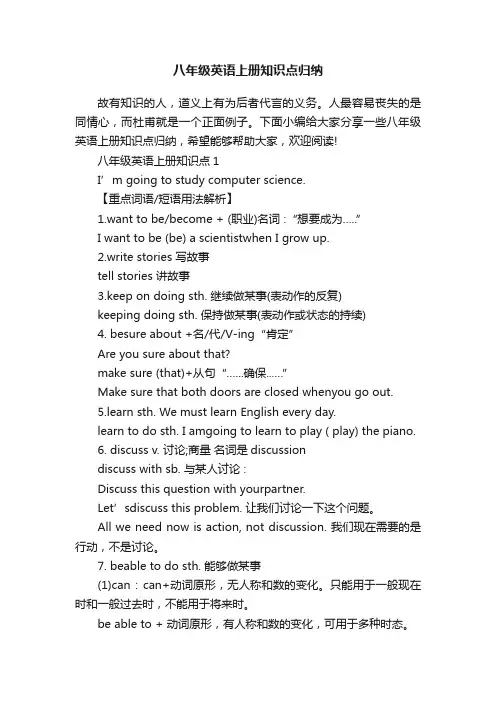
八年级英语上册知识点归纳故有知识的人,道义上有为后者代言的义务。
人最容易丧失的是同情心,而杜甫就是一个正面例子。
下面小编给大家分享一些八年级英语上册知识点归纳,希望能够帮助大家,欢迎阅读!八年级英语上册知识点1I’m going to study computer science.【重点词语/短语用法解析】1.want to be/become + (职业)名词:“想要成为…..”I want to be (be) a scientistwhen I grow up.2.write stories 写故事tell stories 讲故事3.keep on doing sth. 继续做某事(表动作的反复)keeping doing sth. 保持做某事(表动作或状态的持续)4. besure about +名/代/V-ing“肯定”Are you sure about that?make sure (that)+从句“…...确保...…”Make sure that both doors are closed whenyou go out.5.learn sth. We must learn English every day.learn to do sth. I amgoing to learn to play ( play) the piano.6. discuss v. 讨论;商量名词是discussiondiscuss with sb. 与某人讨论 :Discuss this question with yourpartner.Let’sdiscuss this problem. 让我们讨论一下这个问题。
All we need now is action, not discussion. 我们现在需要的是行动,不是讨论。
7. beable to do sth. 能够做某事(1)can : can+动词原形,无人称和数的变化。
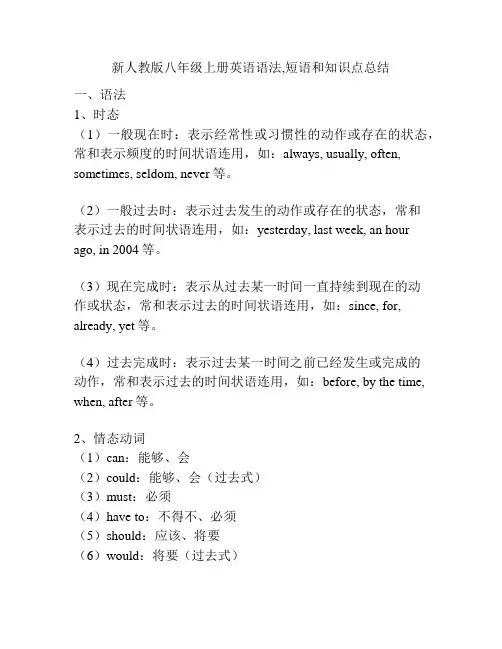
新人教版八年级上册英语语法,短语和知识点总结一、语法1、时态(1)一般现在时:表示经常性或习惯性的动作或存在的状态,常和表示频度的时间状语连用,如:always, usually, often, sometimes, seldom, never等。
(2)一般过去时:表示过去发生的动作或存在的状态,常和表示过去的时间状语连用,如:yesterday, last week, an hour ago, in 2004等。
(3)现在完成时:表示从过去某一时间一直持续到现在的动作或状态,常和表示过去的时间状语连用,如:since, for, already, yet等。
(4)过去完成时:表示过去某一时间之前已经发生或完成的动作,常和表示过去的时间状语连用,如:before, by the time, when, after等。
2、情态动词(1)can:能够、会(2)could:能够、会(过去式)(3)must:必须(4)have to:不得不、必须(5)should:应该、将要(6)would:将要(过去式)3、虚拟语气(1)一般现在时:主语+should/were to +动词原形+其他(2)一般过去时:主语+should/were to have +过去分词+其他二、短语1、make a difference:有影响,有区别2、at once:立即,马上3、take care of:照顾,照料4、in the end:最后,终于5、be good at:擅长于6、as well as:也,又7、keep healthy:保持健康8、come true:实现,成真三、知识点一般现在时:表示经常性或习惯性的动作或存在的状态,常和表示频度的时间状语连用,如:always, usually, often, sometimes, seldom, never等。
牛津版八年级英语上册语法知识点总结1. 时态1.1 一般现在时- 表示经常发生的动作或存在的状态。
- 构成:主语 + 动词原形。
1.2 一般过去时- 表示过去发生的动作或存在的状态。
- 构成:主语 + 动词过去式。
1.3 一般将来时- 表示将来会发生的动作或存在的状态。
- 构成:主语 + 情态动词(will/shall)+ 动词原形。
2. 被动语态2.1 被动语态的构成- 一般现在时:主语 + am/is/are + 过去分词。
- 一般过去时:主语 + was/were + 过去分词。
- 一般将来时:主语 + will be + 过去分词。
2.2 被动语态的用法- 强调动作的承受者。
- 表示动作的执行者不重要或未知。
3. 情态动词3.1 情态动词的用法- can表示能力或可能性。
- may表示请求或允许。
- must表示肯定推测或强制。
- should表示应该或建议。
- shall表示承诺或警告。
- will表示意愿或将来时。
3.2 情态动词的辨析- can和may表示可能性,但can表示能力时不能用may替换。
- must表示肯定推测时,后句用否定形式;表示强制时,后句用肯定形式。
- shall和will表示意愿,但shall用于第一人称,will用于第三人称。
4. 句子结构4.1 简单句- 包含一个主语和一个谓语。
- 例如:The cat sleeps.4.2 并列句- 包含两个或多个主语和谓语,用并列连词连接。
- 例如:The cat sleeps, and the dog barks.4.3 复合句- 包含一个主句和一个或多个从句。
- 例如:The cat sleeps when the sun sets.4.4 复杂句- 包含一个主句和两个或多个从句。
- 例如:The cat sleeps when the sun sets, and the dog barks at night.5. 疑问句5.1 一般疑问句- 采用倒装结构,将助动词或情态动词移至主语前。
八年级上册英语语法知识点归纳总结1.词类:(1)名词:①普通名词,指人、事物、地点或抽象概念的名称,例如:boy, school, chair等。
②专有名词,指以特定的代号指代某一个固定的个体,例如:Beijing, Li Lei等。
(2)代词:指代替句中的人或物的词,例如:I, you, he, she, it等。
(3)形容词:修饰名词或代词,用来修饰,说明人或物的特征,例如:medium, happy等。
(4)副词:修饰动词、形容词和其他副词,用来修饰,表示程度大小,例如:fast, nearly等。
(5)动词:表示动作或状态的词,例如:work, jump等。
(6)助动词:表示“可能性”,“客观的努力”和“成功与否”,例如:can, should, must等。
2.时态:(1)一般现在时:描述现在发生或存在的动作或情况,例如:He talks with his friends every day.(2)一般过去时:描述过去发生或存在的动作或情况,例如:He talked with his friends yesterday.(3)一般将来时:表示将要发生的动作或情况,例如:He will talk withhis friends tomorrow.(4)现在进行时:表示正在进行的动作或情况,例如:He is talking with his friends now.(5)过去进行时:表示过去发生的持续性的动作,例如:He was talking with his friends at that time.3.句子:(1)陈述句:表述的是一个简单的事实,是客观真理,例如:He is twelve years old.(2)疑问句:表述的是一个疑问,旨在寻求答案,例如:How old is he?(3)祈使句:表述着一种请求、命令或建议,例如:Listen to me carefully.(4)感叹句:表达着一种感叹、惊讶、声明或概括的句子,例如:Whata wonderful day it is!4.句型:(1)一般疑问句:用于寻求答案的疑问句,例如:Do you have a pen?(2)特殊疑问句:用于寻求特定的信息的疑问句,例如:What colour is your schoolbag?(3)祈使句:用于表达请求、命令或建议,例如:Let's help the old man.(4)感叹句:用于表达感叹、惊叹、声明或概括,例如:Oh, how beautiful this scene is!(5)There be 句型:表示某特定人物或地点出现的情况,例如:There are three apples on the table.(6)主谓宾句:表述着动作或存在的一种句子结构,例如:He is playingbasketball.(7)宾语从句:放在句子中,用来解释主句谓语动词的一种句型,例如:He said that he would go to the park.。
人教版八年级上册英语知识点总结一、语法重点1. 时态- 一般现在时:表示经常发生的动作或状态,以及普遍真理。
- 一般过去时:描述过去发生的动作或状态。
- 现在进行时:表示正在进行的动作。
- 过去进行时:描述过去某一时刻正在进行的动作。
2. 代词- 人称代词主格:I, you, he, she, it, we, they。
- 物主代词:my, your, his, her, its, our, their。
- 反身代词:myself, yourself, himself, herself, itself, ourselves, yourselves, themselves。
3. 介词- 表示时间的介词:at, on, in。
- 表示地点的介词:at, on, in。
- 其他常用介词:with, by, for, from, to, of。
4. 句型结构- 一般疑问句:使用助动词do/does构成。
- 特殊疑问句:使用疑问词who, what, where, when, why, how 等。
- 否定句:使用助动词do/does后跟not。
5. 词汇- 动词短语:take off, turn on/off, get up, go to bed等。
- 形容词和副词:big/large, small, quick/fast, slowly, carefully等。
- 常用名词:student, teacher, school, family, friend等。
二、词汇与短语1. 学校相关词汇- classroom, teacher, student, library, gym, cafeteria。
- subject, lesson, homework, project, test, exam。
2. 家庭与朋友- family, parent, brother, sister, friend, neighbor。
八年级上册英语语法重点知识归纳英语重点短语1. 去度假go on vacation2.待在家里stay at home3.去爬山go to the mountains4.去海滩go to the beach5.参观博物馆visit museums6.去参观夏令营go to summer camp7.相当多quite a few8.为……而学习study for9.出去go out10.大部分时间most of the time11.尝起来很好吃taste good12.玩得高兴have a good time13.当然of course14.给……的感觉;感受到feel like15.去购物go shopping重点句型及考点1.为某人买某物buy sth. for sb. / buy sb. sth.2.尝起来……taste + adj.3.看起来……look+adj.4.除了……之外什么都没有nothing…but+动词原形5.看起来……seem+(to be)+ adj.6.到达某地arrive in+大地点 / arrive at+小地点7.决定去做某事decide to do sth.8.尝试做某事try doing sth.尽力去做某事try to do sth.9.忘记做过某事forget doing sth.忘记做某事forget to do sth.10.喜欢做某事enjoy doing sth.11.想去做某事want to do sth.12.开始做某事start doing sth.八年级上册英语句型1 .tell sb. (not) to do sth.告诉某人(不要)做某事2 .want sb. to do sth.想要某人做某事3 .be busy with sth.忙于某事4 .spend money/time on(doing) sth.花费金钱/时间去做某事5 .hope to do sth./hope(that)…希望……6 .wish sb. to do sth.希望某人做某事7 .find sb. doing sth.发现某人正在做某事8 .remember to do sth.记得要去做某事 remember doing sth.记得曾经做过某事9 .forget to do sth.忘记要去做某事 forget doing sth.忘记曾经做过某事10 .plan to do sth.计划做某事11 .take sb. some time/money to do sth.做某事花费某人时间/金钱12 .sb. pay(s) money for sth.某人在某物上花费金钱。
八年级上册英语语法归纳总结第1篇单音节形容词和部分双音节词大多是以y、ly、er结尾的双音节形容词,一般在词尾加-er。
以不发音字母e结尾的词,在词尾直接加-r。
重读闭音节词词尾只有一个辅音字母,元音发短音时,双写尾字母,再加er。
以“辅音字母+y”结尾的双音节词,变“y”为“i”,再加-er。
多音节词三音节及以上和部分双音节词,在词前加“more”。
部分形容词和副词的比较级是不规则的,如:good/well-better,bad/badly-worse。
由“动词+后缀-ing/-ed”构成的形容词,在词前加more构成比较级。
如:interesting-more interesting,bored-more bored。
由“形容词+后缀-ly”构成的副词,在该副词前加more构成比较级。
如:slowly-more slowly,happily- more happily。
八年级上册英语语法归纳总结第2篇He said I was hard-working.重点语法:宾语从句结构:主语 + 谓语动词 + 宾语从句(主语 + 谓语动词 + 宾语/表语)例句:----Im good at English. He says. (改为加宾语从句的复合句)----He says Im good at English.注意:①主句是一般现在时态,宾语从句的时态不受其影响。
例句:He says Im good at English now.He says I was good at mathematics when I was young.②主句是过去时态,宾语从句也要用过去时态。
例句:He said I was good at mathematics when I was young yesterday.He said I was good at English now yesterday.③宾语从句是客观真理时永远用一般现在时态。
英语八年级上册知识点归纳Unit1 Where did you go on vacation?【重点语法】不定代词:不指名代替任何特定名词或形容词的代词叫做不定代词。
用法注意:1. some 和any +可数名/不可数名。
some 多用于肯定句,any多用于否定句、疑问句和条件从句。
有些问句中用some,不用any, 问话者希望得到对方肯定回答。
2. 由some, any, no, every 与body, one, thing构成的复合不定代词作主语时,其谓语动词用三单。
3. 不定代词若有定语修饰,该定语要置于其后:如:something interesting【重点短语】1. buy sth for ab./ buy sb. sth 为某人买某物2. taste + adj. 尝起来……3. nothing...but + V.(原形) 除了……之外什么都没有4. seem + (to be) + adj 看起来5. arrive in + 大地方/ arrive at + 小地方到达某地6. decide to do sth. 决定做某事7. try doing sth. 尝试做某事/ try to do sth. 尽力做某事8. enjoy doing sth. 喜欢做某事9. want to do sth. 想去做某事10. start doing sth. 开始做某事=begin doing sth.11. stop doing sth. 停止做某事区分:stop to do sth. 停下来去做某事12. dislike doing sth. 不喜欢做某事14. so + adj + that + 从句如此……以至于……16. tell sb. (not) to do sth. 告诉某人(不要)做某事17. keep doing sth. 继续做某事18. forget to do sth. 忘记去做某事/ forget doing sth 忘记做过某事【词语辨析】1. take a photo/ take photos 拍照quite a few+名词复数“许多…”2. seem + 形容词看起来…... You seem happy today.seem + to do sth. 似乎/好像做某事 I seem to have a coldIt seems + 从句似乎..…. It seems that no one believe you. seem like ... 好像,似乎….. It seems like a good idea.3. arrive in +大地点= get to= reach+地点名“到达......”arrive at +小地点(注:若后跟地点副词here/there/home, 介词需省略,如:arrive here; get home)4. feel like sth 感觉像…feel doing sth. 想要做某事5. wonder(想知道)+疑问词(who, what, why)引导的从句。
矿产资源开发利用方案编写内容要求及审查大纲
矿产资源开发利用方案编写内容要求及《矿产资源开发利用方案》审查大纲一、概述
㈠矿区位置、隶属关系和企业性质。
如为改扩建矿山, 应说明矿山现状、
特点及存在的主要问题。
㈡编制依据
(1简述项目前期工作进展情况及与有关方面对项目的意向性协议情况。
(2 列出开发利用方案编制所依据的主要基础性资料的名称。
如经储量管理部门认定的矿区地质勘探报告、选矿试验报告、加工利用试验报告、工程地质初评资料、矿区水文资料和供水资料等。
对改、扩建矿山应有生产实际资料, 如矿山总平面现状图、矿床开拓系统图、采场现状图和主要采选设备清单等。
二、矿产品需求现状和预测
㈠该矿产在国内需求情况和市场供应情况
1、矿产品现状及加工利用趋向。
2、国内近、远期的需求量及主要销向预测。
㈡产品价格分析
1、国内矿产品价格现状。
2、矿产品价格稳定性及变化趋势。
三、矿产资源概况
㈠矿区总体概况
1、矿区总体规划情况。
2、矿区矿产资源概况。
3、该设计与矿区总体开发的关系。
㈡该设计项目的资源概况
1、矿床地质及构造特征。
2、矿床开采技术条件及水文地质条件。